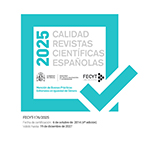La democracia participada en procesos de transformación escolar. Estudio de caso
Resumen
Introducción. Este artículo presenta las transformaciones que el concepto de democracia ha experimentado en la cultura escolar de un centro a lo largo de cuatro procesos de Investigación Acción Participativa. Su objetivo consiste en comprobar si la problematización de saberes entre los diferentes colectivos de la comunidad educativa así como las propias dinámicas de la IAP han provocado la construcción conjunta de conocimiento sobre el hecho democrático, y si esto a su vez ha producido transformaciones en las personas participantes y en la cultura del centro educativo. Método. Se trata de un estudio de caso cuyo análisis incluye la revisión de los resultados de cada proyecto y su contraste con la actual percepción de los actores implicados. Resultados. La democracia se ha inscrito en la cultura escolar de este centro construyendo su propio modelo inclusivo y participativo no exento de tensiones. El sentido de la educación democrática ha resignificado los fundamentos, las prácticas y la identidad del centro. Discusión. Los procesos de IAP posibilitan la definición colectiva de una cultura escolar emancipadora y contribuyen a que la escuela se incluya en su territorio como agente social proactivo y comprometido con la transformación social. Sin embargo, se constata que falta por avanzar en cuanto a la participación del alumnado en los espacios de decisión organizativa.
Descargas
Descarga artículo
Licencia
La Revista Complutense de Educación, para fomentar el intercambio global del conocimiento, facilita el acceso sin restricciones a sus contenidos desde el momento de su publicación en la presente edición electrónica, y por eso es una revista de acceso abierto. Los originales publicados en esta revista son propiedad de la Universidad Complutense de Madrid y es obligatorio citar su procedencia en cualquier reproducción total o parcial. Todos los contenidos se distribuyen bajo una licencia de uso y distribución Creative Commons Reconocimiento 4.0 (CC BY 4.0). Esta circunstancia ha de hacerse constar expresamente de esta forma cuando sea necesario. Puede consultar la versión informativa y el texto legal de la licencia.











